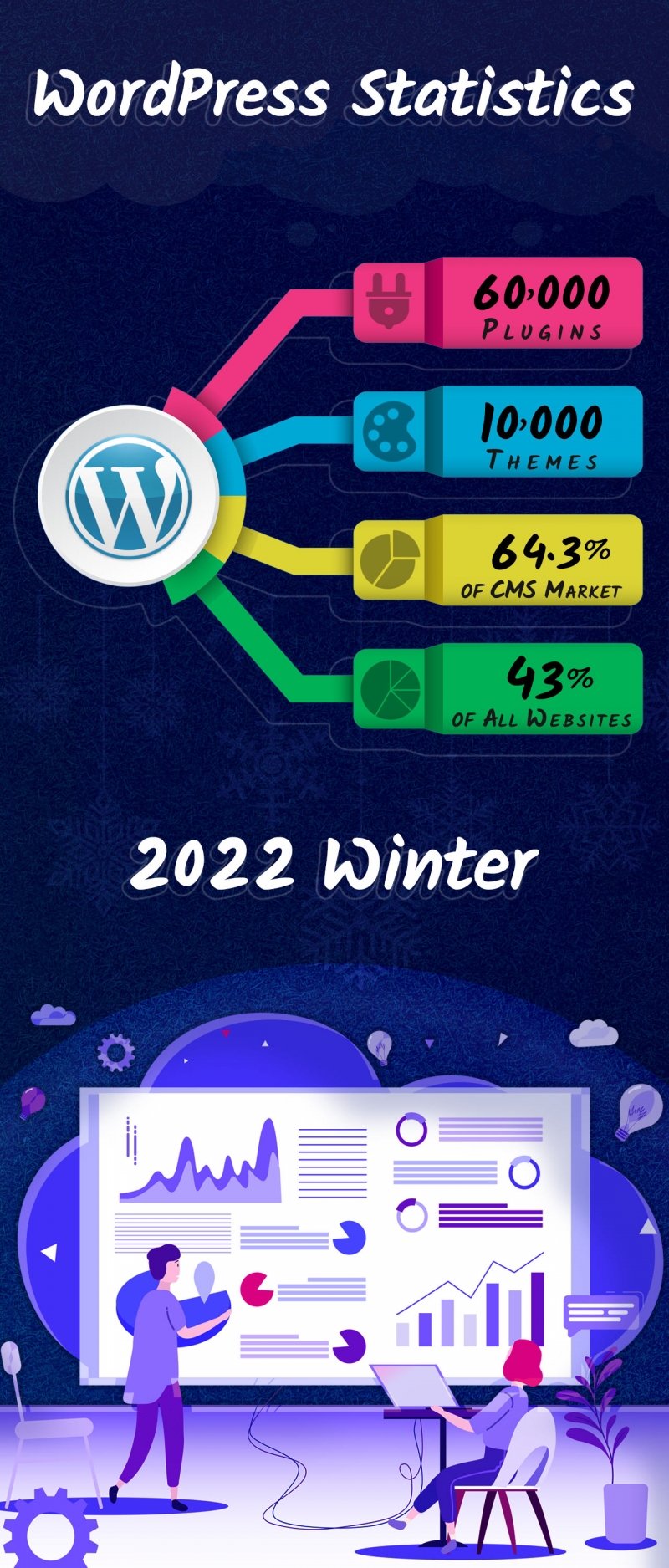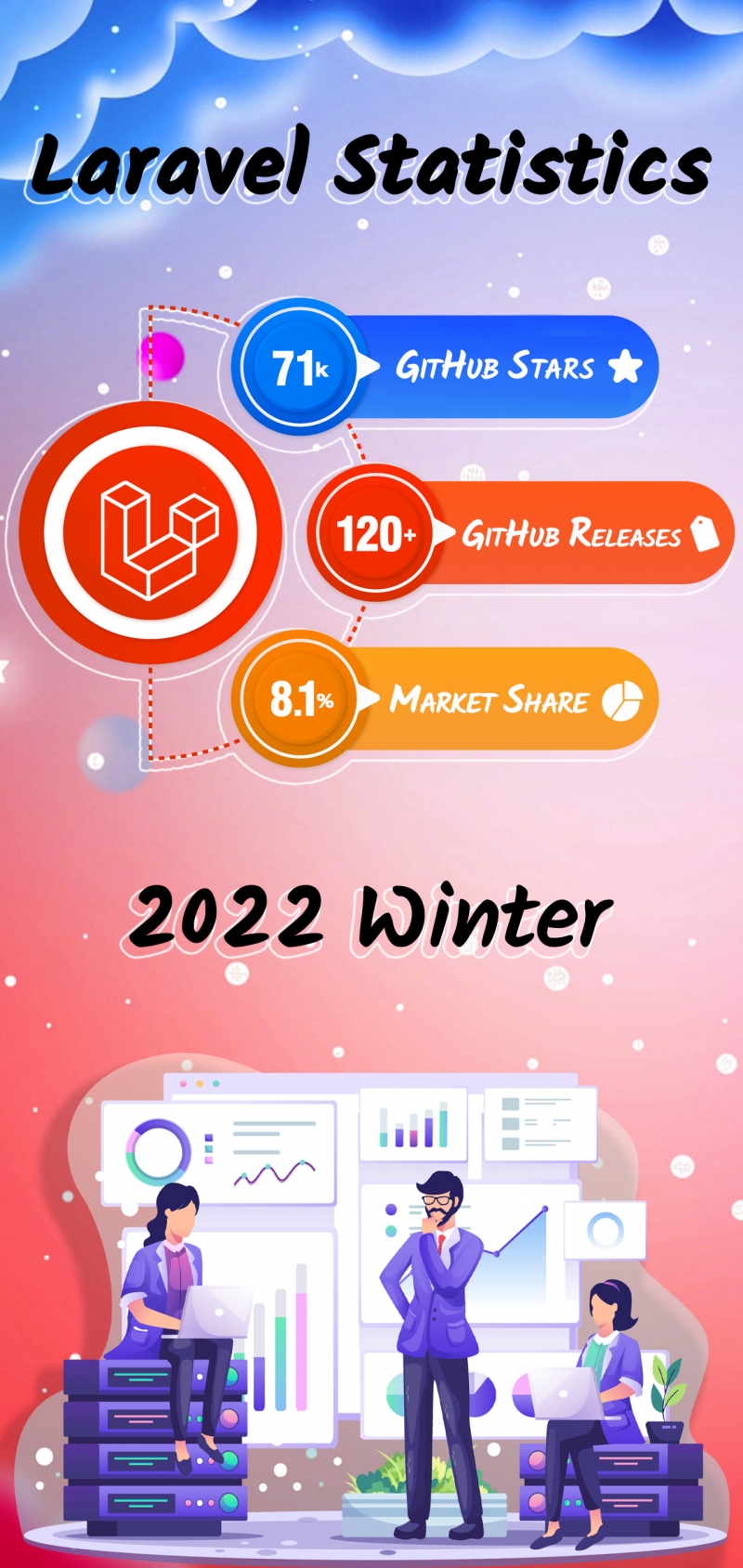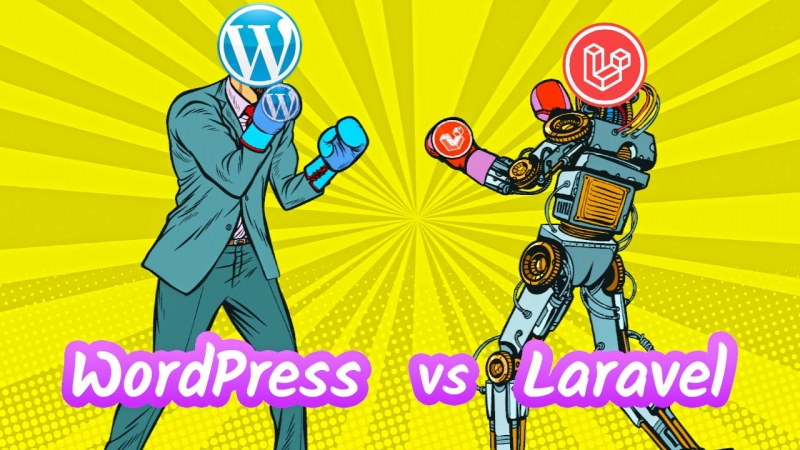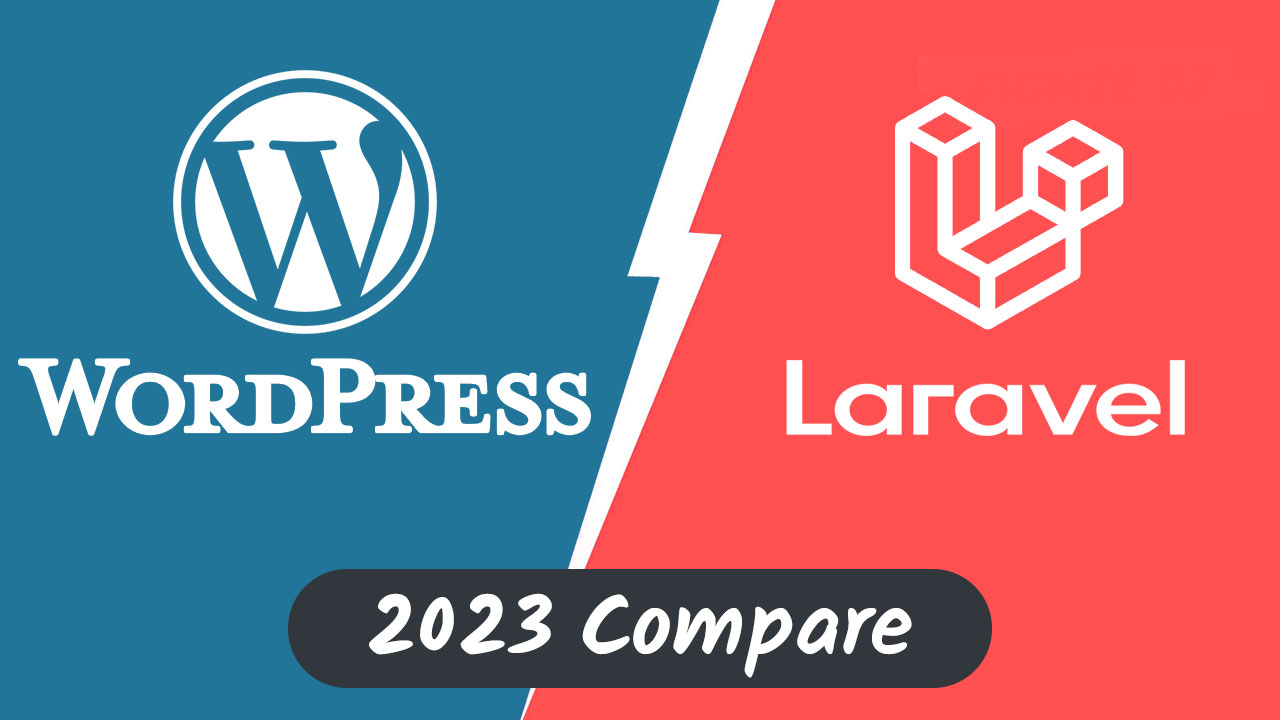Are you choosing between WordPress and Laravel for your following website? Read this in-depth article to understand the difference between WordPress and Laravel. This article includes WP and Laravel statistics, use cases, predictions, other competitors, and much more!
With the year 2023 getting closer and closer, many developers are wondering about the state of web frameworks for the following year.
The two giants in the war of PHP frameworks, WordPress and Laravel, are the main focus regarding comparison.
What is the outcome of this war in 2023? Will we see one of them lose, or will new competitors join the fight in the end?
That’s what I’m going to review in this article.
But do not think of me as a biased WordPress developer because I love Laravel and have used it in many projects.
I love Laravel as much as WordPress, if not more. But today, I’m going to review both of these friends of mine to see which one is more useful in 2023.
When to Use WordPress and Laravel in your Web Development Projects?
WordPress CMS is simple, and it has an admin panel. Besides, thousands of plugins and themes are ready to install with a single click.
On the other hand, Laravel is better structured for developers. Also, It does not limit you in any way and has a massive community of helpful developers ready to help beginners.
From my point of view, If you want an effortless website ready to go, you better choose WordPress.
But, If you have the time and knowledge to develop a feature-rich website, Laravel can utilize you.
To sum up, when you want just a blog or a simple website, do not waste your time with Laravel. Choose WordPress for its cost efficiency.
On the contrary, when you have too many features in your plan, do not limit your abilities with WordPress. Choose Laravel because of its scalable structure.
The State of WordPress CMS in 2023
I started using WordPress for my websites in 2009 after losing belief in Joomla! CMS.
What is a CMS? It stands for Content Management System. in other words, CMS is a web-based software that controls a website’s content.
With this definition, WordPress is created for content managers to write and modify articles and other types of content.
Yet, WordPress has a great set of useful functions that can help developers to build any type of website they want, related or unrelated to content.
So, you can create a feature-rich website or web application using WordPress, even if it was initially a blogging platform.
Considering a WordPress website’s simplicity and cost efficiency, it’s no wonder this platform powers more than 43% of the global web today (64.3% of websites with a CMS).
Also, over 70,000 plugins are ready to install on WordPress with a single click. This enormous directory enables you to create an innovative website as fast as possible.
Moreover, WordPress has nearly 10,000 themes provided by creative designers in the wordpress.org directory until the last days of the year 2022.
It’s important to know there are over 60,000 themes available for free download or purchase in all directories.
With this in mind, we can guess that WordPress will still be super popular next year too.

What are the priorities of the WordPress development team for the year 2023?
In summary, the WordPress development team focused on implementing effortless visual tools, improving agility, encouraging creativity by pushing boundaries, and increasing security.
To get more information about WordPress’s development ideology, I recommend watching this awesome video on youtube:
Matt Mullenweg on How WordPress Continues to Thrive
In this video, Matt Mullenweg, founder of WordPress, talks on the “This Week in Google” podcast about WordPress visionaries and other subjects unrelated to WP.
So, before watching the video (If you did not already!), let’s review WordPress priorities for 2023 with details:
1- Implementing easy to use web design interface with visual blocks, handlers, and drag & drop ability
The WordPress development team and the CEO, Matt Mullenweg, are focused on implementing an effortless visual builder for the platform.
Considering the popularity of the Elementor plugin, you can guess WordPress itself lacks a helpful tool for creating a customized page using visual handlers.
Still, we can credit the WordPress developers for introducing Gutenburg, a block-based editor that can help you create pages in a more manageable approach.
Yet, a WordPress admin will feel limited when using WordPress’s page editor with zero coding knowledge.
To overcome this, Matt Mullenweg suggested revising how WordPress’s default page builder works for future updates.
2- Improving agility by providing more ready-to-use functionalities
It’s noticeable that WordPress developers are concerned about the agility of creating a website and being ready for competition without wasting time on development.
They created WPVIP, a premium CMS for enterprises based on open-source WordPress.
While WordPress is easy to install and ready to use, It looks simple after a fresh installation.
As a matter of fact, after installation, a WordPress developer must add essential plugins, design a theme, and do the SEO configuration.
Now you can guess why a WP website takes more time than expected by clients.
The WordPress development team constantly works on ready-to-use features. For this reason, I guess there will be many more features after an installation next year.
3- Increasing security by implementing website protection features, releasing security patches, and forcing older version updates
WordPress is an open-source platform, which makes it vulnerable. So, security updates are super crucial for such a system.
Hackers can do the same as long as developers can read WordPress core codes.
A developer reads the codes to implement new features, and a hacker reads them to find vulnerabilities.
WordPress, like other open-source platforms, had security issues fixed after platform updates. I can imagine there are more vulnerabilities available to use by hackers right now.
Also, Keep this in mind, with this CMS getting bigger and bigger, maintaining security will be much more challenging for the development team.
As a result, I guess I will receive security updates every once in a while, like in previous versions of WordPress.
Note: remember not to miss any WordPress updates. Equally important, update WP plugins as soon as possible. For the last tip, make sure automatic update feature is enabled on your website.
What I predict for WordPress CMS in the year 2023
Now with WordPress stats and development priorities in mind, I can state that WordPress is not standing any competition in the CMS war.
No other platform is that widely used, and no other competitors are this simple and popular at the same time.
But there are storms nearby, and WordPress developers must be ready to protect what they’ve built against it.
Cost efficiency comes with simplicity. On the other hand, agility requires more complexity. So I can guess this paradox will be a challenge for the WordPress development team in 2023.
I guess WordPress will still thrive in the CMS market. And we can expect to see WordPress taking bigger bites of the CMS market cake.
But in the whole global web market, considering frameworks like PHP Laravel, Javascript Node.js, Python Django, and JAVA Spring, I guess WordPress can lose a little bit of its share.
Smaller websites are using WordPress because of its simplicity and cost efficiency. But bigger fishes in the pond need much more utilization and scalability.
Thus, in the 100,000 top websites of the web, we can see a drop in interest for WordPress. In my opinion, this drop will continue in 2023.
WordPress pros
- WP is easy to install
- Developers love WordPress
- It has a painless admin interface
- It provides default themes (but simple!)
- It survived many winters and delivered stability
- It has a vast directory of free and premium plugins and themes
- and much more!
WordPress cons
- WP standard development approach is not following the popular MVC
- WordPress is not scalable as much as other frameworks like Laravel
- WP has security risks due to encouraging third-party plugins
- It lacks an effortless default page builder in the editor
- Not all enterprises favorite WP as the CMS
- WP is not that agile for enterprises
The State of Laravel PHP Framework in 2023
My history with the Laravel framework started in 2014.
Since then, I’ve used this framework in almost all of my web applications, except for websites & blogs.
Why not websites and blogs? Because of WordPress’s rapid prototyping and its cost efficiency in small projects.
I think Laravel is the better option for implementing more complicated functionalities.
For example, I’ve successfully used Laravel as the central part of CRMs, Data Analysis, Reporting Dashboards, Financial Management Systems, and other feature-rich web applications.
Eather if Laravel was handling the UI or I used it as the API for dynamic UI frameworks, It worked as expected.
If it weren’t for Laravel, some of these projects would take much longer to complete. That means I would be a rich freelancer with unhappy clients if Laravel did not exist.
Laravel is still pushing forward by releasing newer versions, and some of the introduced features are still exciting.
Not to mention, upgrading an older version of Laravel is not a brainers.
The latest version of Laravel is v9, and the Laravel team will release version 10 is next year in the middle of spring.
The current market share for Laravel is around 8% in the last days of 2022, but the growth history promises more for the following year.

What makes Laravel a fantastic framework for web developers?
First, the way you code in Laravel is much cleaner, rememberable, and understandable for teammates.
With the decoupling coding structure that Laravel provides, you can categorize your codes into different files and directories.
This way, you can always find what you need without scrolling through thousands of lines.
Second, this framework helps you connect with other developers to share codes and experiences. This feature promises a helpful community to grow among professionals.
When the community members help each other, projects get done rapidly, and issues vanish with just a google search.
Last but not least, Laravel handles the repeating functionalities of any project quickly.
For example, user authentication is a breeze in the Laravel development process.
This way, instead of spending time on recurring functionalities, you can focus on essential parts of your project.
What are the priorities of the Laravel development team for the year 2023?
Considering the market share of around 8%, Laravel still has a long road to conquer territories of other frameworks. But it’s the goal of this fantastic developer-friendly framework.
I expect that in 2023, we’ll hear much more from the Laravel developer team’s accomplishments.
Here are the priorities of the Laravel development team for the year 2023:
1- Laravel 10, the foremost two-digits version of Laravel
Laravel 10 is still under development today. As I mentioned, the Laravel team will release the v10 in February 2023.
Laravel 10 will be the main branch of the framework until August 2024. And it will receive security updates two years after the initial release of this version.
It’s important to mention that the Laravel team set February 2024 as the end-of-life date for version 9.
Note: January 2023 will be the Laravel 8 end of life date. Thus, if you are still using Laravel 8, and you are concerned about security, you must upgrade it quickly.
Will the next version of the Laravel framework introduce a new cornerstone feature? Because of the almost perfect structure of the framework and what it has accomplished until today, I’m not that positive about that. But there is still a chance to experience significant changes in the framework’s next release.
Laravel 10 will require PHP 8 or higher to run, just like Laravel 9. But it’s set to drop PHP 8.0 in the Laravel 10 and rely on PHP 8.1 entirely.
According to Laravel’s GitHub pull requests, version 10 will adapt more with PHP type declaration and other server-side technology updates.
2- Introducing more out-of-box functionalities to help developers get the job done faster
Laravel makes the developer’s jobs more manageable; it has been the primary goal of Laravel development since the first initial release.
In almost all updates, the Laravel team replaced a few repeated codings with default options to make it faster for developers to implement functionalities.
As I witnessed in Laravel’s GitHub, the tradition is honored by making path parameters optional in Filesystem methods.
From a developer’s point of view, It’s satisfying when you only focus on functionalities, not minor details, while implementing them.
I predict Laravel 10 will have much more to offer to make coding faster and more efficient. After all, we’re using frameworks to save time.
3- Implementing cleaner code structures and decoupling functionalities
Professional developers always simplify classes and methods and decouple their codes to make them reusable. It’s a part of the coding principles we know as SOLID.
Not to mention, Laravel has a perfect coding structure that makes this framework perfect for attracting community-lover developers.
With a clean code base, Laravel developer can share their experience and make other developers’ jobs easier.
As I mentioned, the purpose of using a framework is to save time. Therefore, sharing codes honor its spirit.
4- Providing security updates for previous releases
Laravel 8 will stop receiving security updates from the 24th of January, 2023. But the Laravel team will still provide security updates for Laravel 9 until February 2024.
Thus, we will see a few updates in 2023 for Laravel v9 centered around security issues. Also, we can expect bug-fixing releases for this version until August 2023.
5- Energizing the Laravel community to stay fateful
Laravel successfully attracted a large community of developers worldwide. Therefore Laravel’s team’s responsibility is to energize this community to stay there. And also attract more developers to make the community even more extensive.
I expect Laravel’s founders to manage news attracting official conferences in 2023 (Laracon).
For Indian developer friends, there is a Laracon event scheduled for 25-26 February 2023 at Ahmedabad, Gujrat (Unfortunately, I’m not an Indian, but I love you guys).
What I predict for Laravel Framework in the year 2023
As the perfect PHP framework for many web projects, Laravel is so damn popular among developers.
If the Laravel development team becomes better at advertising the framework, I predict a larger market share for Laravel in 2023.
Why would anybody use other frameworks while Laravel does the job much faster and more securely? The answer is the advertisement of different frameworks.
As can be seen, Laravel needs more news attention and cornerstone features.
One of the primary issues with Laravel is that the framework lacks an easy-to-install user interface like WordPress offers. As a result, it will repel beginners or users with zero knowledge of web development.
What if non-developer users of the web could use Laravel? They could potentially become a developer at the end when they need to implement custom features.
It is not one of the developer team’s concerns right now. But in 2023, attracting non-developers can be the game changer for the Laravel framework.
Laravel pros
- Laravel’s decoupled structure makes it easier for developer team members to focus on their jobs without concern
- Laravel framework makes coding faster by providing default values for recurring parameter initiations
- Managing database functions using Laravel’s Eloquent is satisfying for developers
- Thousand of packages are ready to include in development using composer
- Laravel framework constantly adapts to the latest technologies of the web
- The large community of Laravel developers is heartwarming
- and much more!
Laravel cons
- Laravel is concerned about developers and neglects users with zero web development knowledge.
- The Laravel development team stops updating previous releases of the framework after 2-3 years.
- It’s challenging for beginner developers to develop web applications using Laravel
- Learning to develop the Laravel framework requires time and effort.

Will Other Competitors Surprise WordPress and Laravel to Take a Big Bite of Market Share?
I do not see this happening in 2023, at least in the PHP language. Yet, Considering the growth history of Node.js projects, the JavaScript world shows that it can be surprising anytime.
It’s important to mention, according to w3techs, JAVA usage in server-side is surprisingly increased in 2022.
Who are the direct competitors to WordPress CMS right now?
WordPress’s market share is enormous, but competitors are still alive.
Between frameworks, there are a bunch of CMSes that compete with WordPress right now:
- Joomla!
- Drupal
- Magento (e-commerce)
- Prestashop (e-commerce)
- Shopify (Not open source)
- Squarespace (Not open source)
- WIX (Not open source)
- Weebly (Not open source)
- Ghost (JavaScript)
Who are the direct competitors to Laravel Framework right now?
Laravel is a backend framework with many competitors in different languages. Some of them are:
- Symphony
- CodeIgniter
- Zend
- CakePHP
- Yii 2
- Aura
- Slim
- Phalcon
- Fuel PHP
- FatFree
- Django (Python)
- Spring (JAVA)
- Next.js (JavaScript)
- Meteor (JavaScript)
Is there a reason to believe in other competitors?
In the PHP world, I must say NO!
But in other languages, due to differences in processing performances, there can be reasons to believe in the competitors.
For example, if we consider JavaScript’s ability to process functions Asynchronously, We can believe in a bright future for JavaScript platforms.
Same for JAVA, when we consider the user-friendliness of JAVA syntax, besides asynchronous processing, we can believe JAVA can be surprising regarding web development.
In case of a new competitor attacking the market, which one is a safer bet, WordPress or Laravel?
I believe the tree with deeper roots is safer in storms.
I am considering the initial release date, market share, available plugins, community, etc. WordPress is the safer bet for developers who do not want to take the risk.

Conclusion: the Summary of Comparing WordPress vs. Laravel for the Year 2023
WordPress and Laravel are not direct competitors due to differences in functionality. Yet, they will clash with each other at some points.
Even though WordPress CMS is a PHP framework, considering the user interface and default database structure, It’s a CMS. In comparison, Laravel is only a PHP framework that can build a CMS.
WordPress will still be the best CMS out there in 2023. Yet, the platform needs a much better visual editor to compete with WIX, Weebly, and Squarespace and not lose market share.
To compete with Laravel as a PHP framework, WordPress needs a better developer-friendly structure, maybe MVC or other options.
On the other hand, Laravel needs a user interface and a better installation approach to compete with WordPress.
Also, to compete with other PHP frameworks for market share, Laravels needs more public events and not just implementing out-of-box features.
As a developer, if you want just a simple website, choose WordPress because of its cost-efficiency.
But if publishing a feature-rich website or web software is what you’ve planned, you better choose Laravel for that project.
written by Mehdi Nazari about in WordPress WordPress Facts WordPress Tips
What do you think about "WordPress vs. Laravel: The Most Promising in the Year 2023!"?

